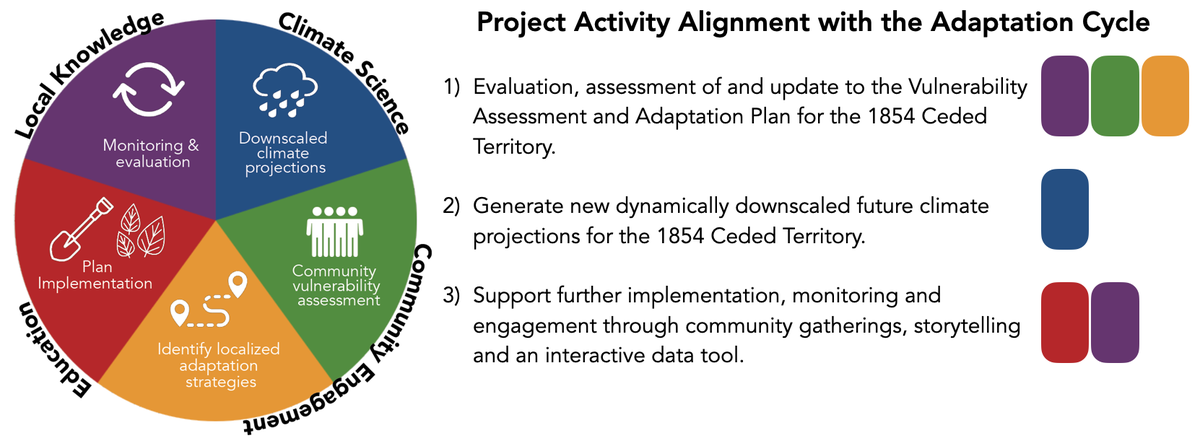Project Summary
Managing Minnesota’s aquatic and natural resources in a changing climate requires data, trusted partnerships, and the capacity to engage in continuous dialogue and learning about how climate changes are translating into climate impacts on ecosystems and people — and critically to understand the efficacy of actions intended to enhance climate resilience. This continuous, iterative nature of climate adaptation affords rich opportunities for knowledge sharing, monitoring, and evaluation of the characteristics, approaches and outcomes that lead to climate resilience. In the Midwest, many Tribes and Inter-Tribal entities are leaders in climate adaptation and are well into the implementation phase of their first adaptation plans, providing an opportunity to explore how and the extent to which resilience is being achieved through different adaptation strategies intended to protect ecosystem and cultural resources. In Northern Minnesota, the 1854 Treaty Authority and Bois Forte, Fond du Lac and Grand Portage Bands have six years of implementation experience following their plan release in 2016 and they are prepared to update this plan, incorporate new knowledge and evaluate progress toward resilience.
This collaborative project seeks to bring together a range of expertise and perspectives to assess and evaluate progress toward climate resilience across the 1854 Ceded Territory and to use this knowledge to co-develop an updated adaptation plan for the 1854 Treaty Authority and the Bois Forte, Grand Portage, and Fond du Lac Bands that incorporates different knowledge (e.g. climate data and tribal observations and stories) and fosters relationships required to develop knowledge and resources that are both useful and used.
The project team will:
- Evaluate progress, barriers to, and opportunities for adaptation following the first six years of implementation;
- Generate dynamically downscaled future climate projections for the 1854 Ceded Territory and incorporate these into an updated adaptation plan; and
- Co-produce an interactive data tool to share these data with tribal members, resource managers and other adaptation professionals in tandem with community engagement efforts designed to showcase the region’s progress toward community and ecosystem climate resilience.

This project will position the 1854 Treaty Authority to leverage resources and investments in support of resilience activities that are becoming more readily available through state and federal funding opportunities. And, through increasing access to, and dissemination of, fundamental future climate data for the Lake Superior region this project has the potential to inform a range of decisions and investments seeking to be climate-ready. Advancing the understanding of adaptation plan development and monitoring and evaluation may help to strengthen and streamline adaptation planning investments being made in other parts of the state and the Great Lakes region.
The project team anticipates that this project will provide data, methods, and an evaluative framework for adaptation assessment that can be used by other Tribes, inter-Tribal entities, and adaptation practitioners. This project should be a strategic investment that can help advance the state of Minnesota’s climate work. The downscaled climate data and the corresponding data tool will serve as a proof of concept to support a broader, statewide effort to generate data for the entire state. The project team plans to make the climate data available for use by other researchers for input into other models (e.g., groundwater) and applications. The project aims to advance the field of adaptation and provide foundational knowledge that can be applied in other climate resilience and research applications.
Project Team

Elise Harrington
Assistant Professor
University of Minnesota
Hubert H. Humphrey School of Public Affairs

Joseph Bauerkemper
Associate Professor
University of Minnesota Duluth

Eve Vangas
Masters student
University of Minnesota Hubert H. Humphrey School of Public Affairs

Joe Warren
Ph.D. Student
University of Minnesota
College of Education and Human Development
Core work areas
References
An overview of the project is available in this tri-fold brochure.
Support
1854 Treaty Authority
Minnesota Sea Grant




